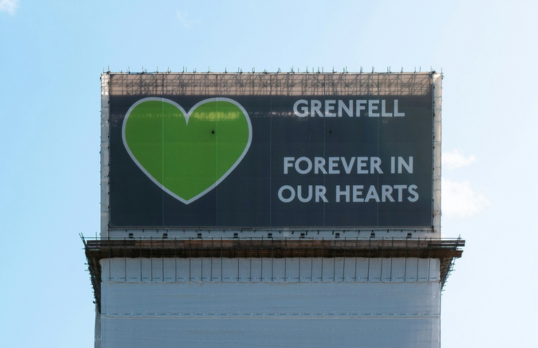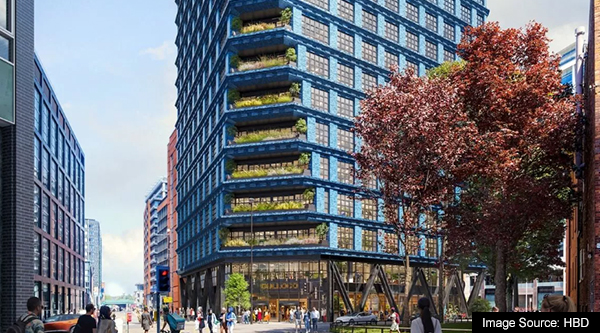The industry has accepted the “thorough examination” of the causes of the tragedy at Grenfell Tower and inquiry report’s findings.
RIBA Chair of Board Jack Pringle said it is only through the objective, independent and expert analysis of the evidence so sadly created by the events of 14 June 2017 that a safer built environment can emerge.
“The failures which led to the fire were system-wide, with myriad contributing factors in the years preceding, on the morning of, and in the aftermath of the tragedy,” he said.
“The report makes clear that people’s safety requires reform of structures and regulations. This includes systemic change within the construction industry, and a fundamental shift in culture and behaviours. This is a collaborative endeavour and RIBA has committed to playing a leading role.
“As the Inquiry also notes, RIBA has taken steps since June 2017 to improve education and training in our profession. With the benefit of these comprehensive findings, and as recommended, we will review the measures already introduced.
“Many of the report’s insights and recommendations, particularly on the role and responsibilities of an architect, have great relevance for our members. We will take time to study them in detail, update our members, and continue to play an active role in the creation of a safer built environment.”

ARB issued a statement on Grenfell Tower Inquiry Phase 2 Report, describing the Grenfell Tower fire as a national tragedy, and one of the UK’s worst modern disasters.
“The public expect architects to always act ethically and in the interest of public safety,” it stated. “They must take accountability for their design work, and raise without fear any concerns they may have. Informed by Dame Judith Hackitt’s earlier recommendations and enabled by new legislation in the Building Safety Act 2022, ARB has introduced a new mandatory scheme for continuing professional development, which will apply to all registered architects. ARB has also developed new Competency Outcomes that all providers of ARB accredited qualifications in architecture must meet.
“The Grenfell Tower Inquiry Phase 2 Report recommends that ARB review the changes we have already made to the training and education of architects, to ensure they are sufficient in the light of the Inquiry’s findings. We will do this and will publish our assessment.
“The report also finds that the architects appointed on the Grenfell Tower refurbishment ‘fell significantly below the standard reasonably to be expected’. The Inquiry has expressed concerns that this may be widespread within the profession. We will consider those findings in further detail, and take into account the involvement of other authorities with prosecuting powers before deciding what further action may be required.
“We will also take time to consider the whole of the report, including in particular the need to ensure a profound shift in culture and behaviour in the built environment sector.”
The Chartered Institute of Architectural Technologists (CIAT) welcomed the publication, stating that the Phase 2 report has identified serious failings in many areas that contributed to this tragedy.
“CIAT is examining the report in detail to respond to the challenges highlighted and is committed to making and supporting any changes that are necessary, individually and collectively, to improve the performance and safety of buildings for all,” it said.
“CIAT, alongside other professional bodies in the built environment sector, is already taking steps to strengthen standards of education, training and professional practice. CIAT led the review of the UK Quality Assurance Agency Subject Benchmark Statement (2022) for undergraduate and postgraduate degrees in Architectural Technology and this included an increased and greater emphasis on building performance, regulation and safety. Following this publication, CIAT reviewed its Professional Standards Framework for Chartered Architectural Technologists to ensure these changes, alongside those arising from the Building Safety Act and the amended building regulations, were reflected. More recently, CIAT implemented a register of competent professionals to undertake the role of Principal Designer (Building Regulations) for both higher risk and non-higher risk buildings.
“CIAT will carefully consider the recommendations of this final report, and where appropriate, will implement changes to improve professional practice to ensure that the UK's built environment can be safe and secure for every community.”
The Construction Leadership Council (CLC) said the Inquiry’s findings are a serious and comprehensive reflection of the worst of UK construction’s culture and practices; which led to a tragedy that should and could have been avoided.
“We fully respect those findings and offer our sympathies and condolences to the families and wider Grenfell community,” it said.
“The Inquiry has also put forward a number of recommendations for both our industry and Government, to ensure that such a tragedy is never repeated. The CLC, as the representative body for the entire UK construction industry, will now study these recommendations and engage with industry and the Government as to how they can be taken forward through our ongoing work on building safety.
“Over the past seven years the CLC and its many members have made building safety one of our highest priorities, actively working to learn from the failures at Grenfell and reform our culture, behaviours and competence. Much of that work is summarised in a recent CLC report here.
“Whilst progress has been made, we know that more work can and should be done to fulfil the CLC’s ambition of establishing an industry that can be trusted to deliver safe and high quality buildings for those who live and work in them. We remain fully committed to this goal.”
At yet another difficult and traumatic moment for the bereaved, the survivors and relatives of the Grenfell Tower victims, the CIC said it recognises once again all that they have suffered and we extend our sympathy once more to all the victims.
“Sir Martin Moore Bick has made many recommendations for further action in the report, based on a careful analysis of the evidence presented to the Inquiry by hundreds of witnesses and in hundreds of thousands of documents,” it said “CIC and its member organisations are now reviewing the full report and its recommendations and carefully considering the further actions that we will need to take.
“Whilst much work has already been done through the independent review of building regulations and fire safety undertaken by Dame Judith Hackitt and the consequent programme of regulatory reform that has been introduced and which the industry is working hard to implement, Sir Martin has clearly identified several further matters that require attention and CIC will be working with its members, the wider industry and government to develop appropriate responses to those matters, ensuring that they are given the critical and expedient attention that they demand.
“It will take time to give the thought and consideration that the report requires and for the action that is needed to address the various recommendations Sir Martin has brought forward. It is essential that government and the construction sector recognise the findings he has reported and that we learn the lessons and continue to respond to create an industry and a culture where safety, competence and compliance with the law is an absolute priority. Only then will public trust in the sector be restored.
“CIC believes that every construction professional should fully familiarise themselves with the report and its recommendations, and we will work closely with our members to facilitate this process as we develop an appropriate detailed response to the report.”
Caroline Gumble, chief executive officer at CIOB, said: “We very much welcome the publication of the final report into the Grenfell Tower fire and will be reading it in detail to understand the implications for the construction sector in the UK.
"Improving the safety of buildings must be a priority. Although some progress has been made with the introduction of the Building Safety Act and changes to the Fire Safety Act, there is still much to do.
"We are committed to working with others across the industry to follow up on the recommendations made in the report. Every step possible must be taken to ensure such a tragedy, which has impacted the lives of so many people, can never happen again.”
CIBSE continues to demonstrate its unwavering commitment to building safety as the final report of the Grenfell Tower Inquiry in now published.
CIBSE Technical Director, Dr Anastasia Mylona, commented on the report: "The findings of the Grenfell Inquiry report are both sobering and a stark reminder of the critical need for transparency, integrity and robust regulation within our industry.
“As the report highlights systemic failures, CIBSE remains committed to driving the necessary reforms in building and fire safety engineering practices. Our role is to ensure that the highest standards are upheld, and that the safety of residents is always the paramount concern in the built environment."
Responding to the final, Phase Two, report, Peter McGettrick, Chairman of British Safety Council, welcomed the publication.
“It is a sobering and comprehensive report which has brought forensic attention to the institutional failings that led to this tragedy, the responsibility for which must be shared across multiple stakeholders,” he said.
"Safety must be at the core of any changes, and we need to see an appropriate and proportionate response by all parties, which delivers on the recommendations in the Inquiry's report and ensures greater clarity, transparency and professionalism at all levels.
“Progress has been made in the past seven years, especially in terms of new legislation and regulation on building safety and social housing, but there is clearly much more to do. The Inquiry's recommendations build on this and we look forward to the Government's response and action to deliver on them."
The Building Engineering
Services Association (BESA) has welcomed the publication of
the final report into the Grenfell Tower tragedy saying that it should add
greater urgency to promised reforms of the construction industry and related
engineering disciplines.
The Association added that it had already suspended
companies from membership who failed to meet their technical and professional
obligations under the Act and would not hesitate to do so again.
“The report reminds us that the industry’s operating
model had evolved to a point where cutting cost was pursued at the expense of
building safety and performance,” said CEO David Frise.
“We must build on the progress made since the tragedy,
evolving into an industry that can clearly demonstrate its competence and
compliance in delivering a built environment that is safe and sustainable.”
FPA Chief Executive Dr Gavin Dunn stated: “The complexity and completeness of the Inquiry resulted in a series of delays to the report’s publication. Now that it has been released, the FPA’s role is to review and consider its implications to enable us to support our members, customers, and the wider industry in understanding and acting on the outcomes to ensure the tragic events of 14 June 2017 are not repeated.
“We would like to acknowledge the work of Sir Martin Moore-Bick and his team in leading the Inquiry, and will comment more fully following careful review and consideration of the report.”




















